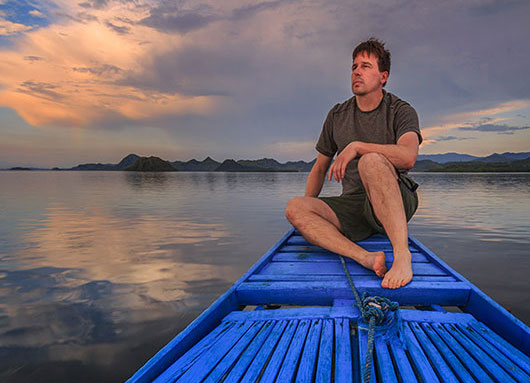During a recent trip to southeast Utah, I spotted a magnificent rainbow arcing high above the twisted red rock desert. Unable to resist its beckoning call, I followed the rainbow to the end, where I found a wee little fellow wearing a bright green suit. He led me into his subterranean lair, glowing brightly from the pot o’ gold found within.
Okay, nothing like this even remotely happened to me, but I did visit Leprechaun Canyon, an enchanting little spot, found a half-hour south of Hanksville, Utah off of state route 95. Although I didn’t see any leprechauns or pots o’ gold, I did find some interesting compositions and colors as midday sunlight found its way into the canyon’s spooky interior.
The hike into Leprechaun Canyon is relatively short, and you can’t go very far into the slot before it narrows too much for the average photographer (you can continue further if you are skilled at extremely narrow, technical canyoneering, but I suspect photography would be very difficult in the technical sections of the canyon). Nonetheless, Leprechaun Canyon offers the chance for some interesting photography.
I spent some time at the entrance to the canyon, before it narrowed into a slot, making some creative self-portraits. Direct sunlight was striking the far canyon wall, so I used the resulting curved shape formed by the contrast between light and shadow as the basis of my composition. I selected my fisheye lens to further enhance the curvy goodness of the scene, and after engaging my camera’s ten-second timer, I triggered the shutter and ran into position. After experimenting with several different poses, I was short of breath, but I finally got the shot I wanted.
As I moved deeper into the canyon, I was attracted to the reflected light bouncing into the interior. Slot canyons are best photographed on bright, sunny days. Light reflects from parts of the canyon in direct sunlight into the shadowed canyon interior, producing an attractive warm glow. I paused to make this photo, using the sand as a curve leading into the background glow.
I spent a lot of time hiking back and forth between the more open parts of the canyon and the narrowest portions of the slot, observing the light as it changed throughout the day, and experimenting with many different compositions. Prime photography light occurred during the four hours that bracketed high noon, with the best light happening between 1 and 2pm (at least, for the time of year when I visited, in January—other times of the year will likely have much different light). For this photo taken in the slot part of the canyon, I included just a hint of the sky, which was bright enough relative to the dark interior to create a bit of lens flare.
For two brief minutes, a beam of sunlight managed to penetrate the narrow canyon and make its way to the canyon floor. The sand at the end of the sunbeam started to glow brightly relative to the dark interior, bouncing a warm reddish glow onto the canyon walls. I worked as fast as I could to capture the moment before it went away. Composition, light, and color all came together perfectly, leaving me with the best photo from my trip.
I may not have found a pot o’ gold, but nonetheless I feel like I was richly rewarded by Leprechaun Canyon. It’s a fun little slot, and it should be on the shot list of any photographer visiting this area of Utah. If you have a few hours to kill in the middle of a sunny day, you won’t regret taking a quick jaunt into Leprechaun Canyon.
About the author: Whether hanging over the rim of an active volcano, braving the elements to photograph critically-endangered species, or trekking deep into the wilderness to places most people will never see, world-renowned professional photographer Ian Plant travels the globe seeking out amazing places and subjects in his never-ending quest to capture the beauty of our world with his camera. Ian is a frequent contributor to many leading photo magazines, Managing Editor of Outdoor Photography Guide, a Tamron Image Master, and the author of numerous books and instructional videos. Known for his inspiring images and single-minded dedication to creating the perfect photo, Ian has reached hundreds of thousands of people around the world in his mission to inspire and educate others in the art of photography. You can see more of his work at www.ianplant.com.
Have something to add to the story? Leave a comment or email editor@outdoorphotographyguide.com.







would love to learn more about photographing slot canyons!
Thank you for your post Ian. I am wondering how long the slot is and if there was a fee to go in or any issues with Native Americans? Scott
I looked at a report on the canyon that said some rappelling was necessary and there were 3 different canyons. I'm not a rock climber and have no experience rappelling. Were you able to enter the canyon without a rock climbing experience? Leprechaun Canyon offers slot canyoneering thrills for all levels of interest and ability. The canyon is actually composed of 3 forks: Left "Shamrock" is easy, Middle "Shimrock" is the most difficult, and Right "Upper Leprechaun is moderate. All of these forks require technical skills and gear, and are definitely not for the novice. Hikers can enter the exit of the Middle Fork at "Belfast Blvd" to get a great idea of how narrow and convoluted a slot canyon can actually be. All of the forks, and Belfast Blvd. offer unique photo opportunities, and can use up all the adrenaline you can muster! From https://www.tripadvisor.com/Attraction_Review-g57006-d8352520-Reviews-Leprechaun_Canyon-Hanksville_Utah.html